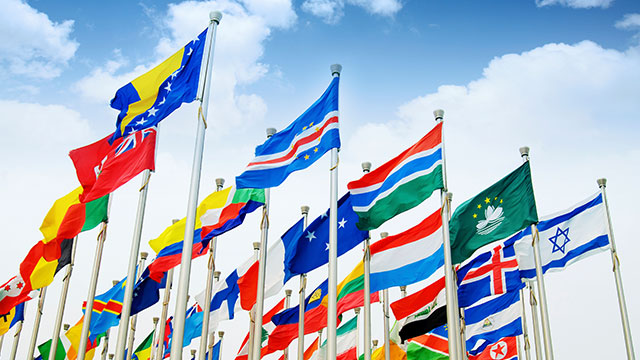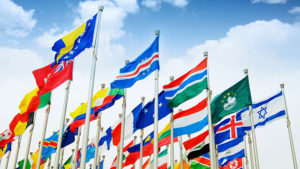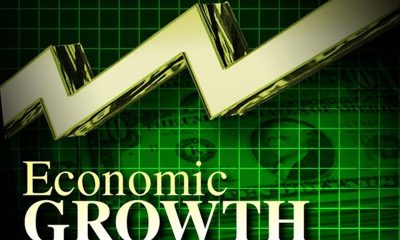Economy
Moderate Economic Growth for Africa in 2017, 2018—Report


By Dipo Olowookere
A moderate economic growth recovery is projected in Africa for 2017-18, even as the global economy continues to be trapped in a prolonged period of slow growth, according to the United Nations World Economic Situation and Prospects (WESP) 2017 Report released today.
The report shows that world gross product grew by just 2.2 per cent in 2016, marking its slowest pace of expansion since the Great Recession of 2009. Global growth is projected to see a moderate improvement to 2.7 per cent in 2017 and 2.9 per cent in 2018, but this is more an indication of economic stabilization than a signal of a robust revival of global demand.
Against this backdrop, Africa is expected to see a recovery in growth, with GDP expanding by 3.2 per cent in 2017 and 3.8 per cent in 2018, up from 1.7 per cent in 2016. The projected increase in global commodity prices will ease fiscal and external pressures for commodity exporters, but a strong growth rebound in these countries appears unlikely. Several other countries, such as those in the East African Community and some Western African economies, enjoy a more favourable growth outlook.
Growth prospects in five African sub-regions
The report notes large differences in growth prospects among the five African subregions. East Africa is positioned to remain the fastest-growing subregion, with aggregate GDP projected to expand by about 6 per cent in 2017 and 2018, helped by the rapid expansion of domestic markets and strong spending on infrastructure.
West Africa is expected to see growth rebound from 0.1 per cent in 2016 to 3.1 per cent in 2017, as the projected increase in oil prices eases severe fiscal and external pressures in Nigeria. For several other West African countries, such as Cote d’Ivoire, Ghana and Senegal, the growth outlook remains strong, underpinned by large infrastructure investments and an improved domestic business climate.
Meanwhile, growth in North Africa is projected to accelerate from 2.6 per cent in 2016 to 3.5 per cent in 2017, contingent on a gradual improvement in the security situation.
The growth outlook for Southern Africa is relatively subdued, with economic activity projected to improve modestly to 1.8 per cent in 2017 and 2.6 per cent in 2018. While South Africa is expected to benefit from a moderate recovery in the agriculture and mining sector, political uncertainty may weigh on investor sentiments.
Growth in Central Africa is projected to strengthen from 2.4 per cent in 2016 to 3.4 per cent in 2017, as higher oil prices support export revenues and growth, particularly in Congo, Equatorial Guinea and Gabon. However, ongoing domestic political unrest will restrain economic activity in the Central African Republic and Gabon.
Inflation dynamics across the region
The report also takes note of marked differences in the inflation dynamics across the region. For the commodity-dependent economies, the weakening of domestic currencies fuelled imported inflation. The adverse impact of drought conditions and rising electricity tariffs added further upward pressure on inflation. In Angola, Mozambique and Nigeria, inflation reached multi-year highs. As high inflationary pressures are expected to persist in these economies, monetary policy stances will likely remain tight.
In contrast, inflation in the region’s net oil importers stabilised or slowed in 2016 and pressures are expected to remain subdued going forward. In several of these countries, including Botswana, Kenya and Morocco, central banks reduced policy rates in 2016 in a bid to stimulate growth.
Risks and policy challenges
The report cautions that there are significant risks to the global and the regional outlook. Among other issues, the report highlights the high degree of uncertainty in the international policy environment and elevated foreign currency-denominated debt levels as key downside risks that may derail global growth.
For Africa, the report identifies renewed weakness in commodity prices and a sharper-than-expected growth moderation in China as major risks. On the domestic side, an escalation of security concerns and political unrest could deter foreign investment and severely disrupt economic activity in some countries.
The report calls for a more balanced policy approach to not only restore robust growth in the medium term, but also to achieve greater progress on sustainable development. Given that commodity prices are projected to increase only modestly, the report also underscores the need for African economies to further strengthen policy measures to tackle domestic structural weaknesses, including measures to accelerate economic diversification, rebuild policy buffers and promote stronger job creation.
Economy
NGX Market Cap Surpasses N110trn as FY 2025 Earnings Impress Investors

By Dipo Olowookere
Investors at the Nigerian Exchange (NGX) Limited have continued to show excitement for the full-year earnings of companies on the exchange so far.
On Friday, Customs Street further appreciated by 1.01 per cent as more organization released their financial statements for the 2025 fiscal year.
During the session, traders continued their selective trading strategy, with the energy sector going up by 2.47 per cent at the close of business despite profit-taking in the banking counter, which saw its index down by 0.11 per cent.
Yesterday, the insurance space grew by 2.16 per cent, the industrial goods segment expanded by 1.70 per cent, and the consumer goods industry jumped by 0.42 per cent.
Consequently, the All-Share Index (ASI) increased by 1,722.13 points to 171,727.49 points from 170,005.36 points, and the market capitalisation soared by N1.106 trillion to N110.235 trillion from the N109.129 trillion it ended on Thursday.
Business Post reports that there were 59 appreciating stocks and 19 depreciating stocks on Friday, representing a positive market breadth index and strong investor sentiment.
The trio of Omatek, Deap Capital, and NAHCO gained 10.00 per cent each to sell for N2.64, N6.82, and N136.40 apiece, as Zichis and Austin Laz appreciated by 9.98 per cent each to close at N6.72 and N5.40, respectively.
Conversely, The Initiates depreciated by 9.74 per cent to N19.45, DAAR Communications slumped by 7.32 per cent to N1.90, United Capital crashed by 6.55 per cent to N18.55, Coronation Insurance lost 5.71 per cent to quote at N3.30, and First Holdco shrank by 5.53 per cent to N47.00.
The activity chart showed an improvement in the activity level, with the trading volume, value, and number of deals up by 33.77 per cent, 93.27 per cent, and 10.63 per cent, respectively.
This was because traders transacted 953.8 million shares worth N43.1 billion in 51,005 deals compared with the 713.0 million shares valued at N22.3 billion traded in 46,104 deals a day earlier.
Fidelity Bank was the most active with 92.4 million units sold for N1.8 billion, Chams transacted 69.2 million units valued at N310.9 million, Deap Capital exchanged 59.1 million units worth N382.7 million, Access Holdings traded 57.2 million units valued at N1.3 billion, and Tantalizers transacted 48.6 million units worth N228.2 million.
Economy
Naira Retreats to N1,366.19/$1 After 13 Kobo Loss at Official Market

By Adedapo Adesanya
The value of the Naira contracted against the United States Dollar on Friday by 13 Kobo or 0.01 per cent to N1,366.19/$1 in the Nigerian Autonomous Foreign Exchange Market (NAFEX) from the previous day’s value of N1,366.06/$1.
According to data from the Central Bank of Nigeria (CBN), the Nigerian currency also depreciated against the Pound Sterling in the same market window yesterday by N2.37 to N1,857.75/£1 from the N1,855.38/£1 it was traded on Thursday, and further depleted against the Euro by 57 Kobo to close at N1,612.52/€1 versus the preceding session’s N1,611.95/€1.
In the same vein, the exchange rate for international transactions on the GTBank Naira card showed that the Naira lost N8 on the greenback yesterday to N1,383/$1 from the previous day’s N1,375/$1 and at the black market, the Nigerian currency maintained stability against the Dollar at N1,450/$1.
FX analysts anticipate this trend to persist, primarily influenced by increasing external reserves, renewed inflows of foreign portfolio investments, and a reduction in speculative demand.
In the short term, stability in the FX market is expected to continue, supported by policy interventions and improving market confidence.
Nigeria’s foreign reserves experienced an upward trajectory, increasing by $632.38 million within the week to $46.91 billion from $46.27 billion in the previous week.
The Dollar appreciation this week appears to be largely technical, serving as a correction to the substantial losses experienced from mid- to late January.
Meanwhile, the cryptocurrency market slightly appreciated, with Bitcoin (BTC) climbing near $68,000, up nearly 5 per cent since hitting $60,000 late on Thursday after investor confidence in crypto’s utility as a store of value, inflation hedge, and digital currency faltered.
The sell-off extended beyond crypto, with silver plunging 15 per cent and gold sliding more than 2 per cent. US stocks also fell.
The latest recoup saw the price of BTC up by 4.7 per cent to $67,978.96, as Ethereum (ETH) appreciated by 6.3 per cent to $2,021.10, and Ripple (XRP) surged by 9.5 per cent to $1.42.
In addition, Solana (SOL) grew by 7.3 per cent to $85.22, Cardano (ADA) added 6.1 per cent to trade at $0.2683, Dogecoin (DOGE) expanded by 5.4 per cent to $0.0958, Litecoin (LTC) rose by 5.2 per cent to $53.50, and Binance Coin (BNB) jumped by 2.3 per cent to $637.79, while the US Dollar Tether (USDT) and the US Dollar Coin (USDC) traded flat at $1.00 each.
Economy
Oil Prices Climb on Worries of Possible Iran-US Conflict

By Adedapo Adesanya
Oil prices settled higher on Friday as traders worried that this week’s talks between the US and Iran had failed to reduce the risk of a military conflict between the two countries.
Brent crude futures traded at $68.05 a barrel after going up by 50 cents or 0.74 per cent, and the US West Texas Intermediate (WTI) crude futures finished at $63.55 a barrel due to the addition of 26 cents or 0.41 per cent.
Iran and the US held negotiations in Muscat, the capital of Oman, on Friday to overcome sharp differences over Iran’s nuclear programme.
It was reported that the talks had ended with Iran’s foreign minister saying negotiators will return to their capitals for consultations and the talks will continue.
Regardless, the meeting kept investors anxious about geopolitical risk, as Iran wanted to stick to nuclear issues while the US wanted to discuss Iran’s ballistic missiles and support for armed groups in the region.
Any escalation of tension between the two nations could disrupt oil flows, since about a fifth of the world’s total consumption passes through the Strait of Hormuz between Oman and Iran.
Saudi Arabia, the United Arab Emirates, Kuwait and Iraq export most of their crude via the strait, as does Iran, which is a member of the Organisation of the Petroleum Exporting Countries (OPEC).
According to Reuters, Iran objected to the presence of any US Central Command (CENTCOM) or other regional military officials, saying that would jeopardise the process.
The current confrontation was sparked by more than two weeks of unrest in Iran that saw authorities launch a deadly crackdown that killed thousands of civilians and shocked the world. As reports of the deaths trickled out of Iran, US President Donald Trump threatened to strike Iran if any of the tens of thousands of protesters arrested were executed.
Meanwhile, Kazakhstan’s planned oil exports could fall by as much as 35 per cent this month via its main route through Russia, as the country’s top oil company, Tengiz oilfield, slowly recovers from fires at power facilities in January.
ING analysts have pointed out Iran’s neighbour, Iraq, and a disagreement with the US as another bullish factor for oil prices. It seems Iraqi politicians favour Mr Nouri al-Maliki as the country’s next Prime Minister, but the US thinks Mr al-Maliki is too close to Iran. President Trump has already threatened the oil producer with consequences if he emerges as PM.
-

 Feature/OPED6 years ago
Feature/OPED6 years agoDavos was Different this year
-
Travel/Tourism9 years ago
Lagos Seals Western Lodge Hotel In Ikorodu
-

 Showbiz3 years ago
Showbiz3 years agoEstranged Lover Releases Videos of Empress Njamah Bathing
-

 Banking8 years ago
Banking8 years agoSort Codes of GTBank Branches in Nigeria
-

 Economy3 years ago
Economy3 years agoSubsidy Removal: CNG at N130 Per Litre Cheaper Than Petrol—IPMAN
-

 Banking3 years ago
Banking3 years agoSort Codes of UBA Branches in Nigeria
-

 Banking3 years ago
Banking3 years agoFirst Bank Announces Planned Downtime
-

 Sports3 years ago
Sports3 years agoHighest Paid Nigerian Footballer – How Much Do Nigerian Footballers Earn

















